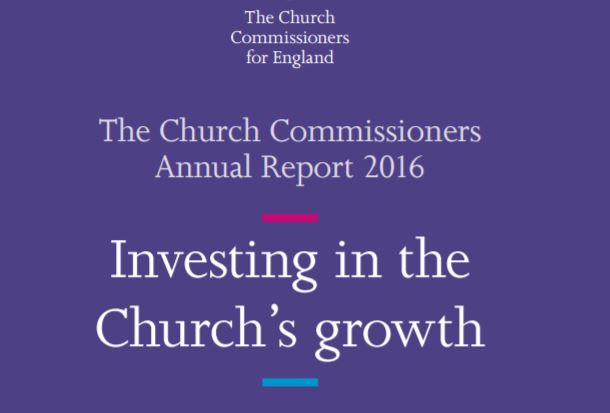The Church Commissioners’ total return on its investments in 2016 was 17.1%, compared with the previous year’s return of 8.2%. Over the past 30 years the fund has achieved an average return of 9.6% per annum.
In 2016 disbursements by the Commissioners totalled £230.7 million, accounting for approximately 15% of the Church’s overall mission and ministry costs. This represents an increase in church expenditure of 5.6% from the previous year.
…
[Sir Andreas Whittam Smith] “Contributing to this stellar outturn was a strong showing by global equities (+32.9%), partly reflecting the depreciation of sterling….”
…
…during 2016 the Church Commissioners established an Engagement department jointly with the Church of England Pensions Board. The team focussed on three areas of intervention at AGMs: executive remuneration, climate change and board diversity.
During 2016, the Commissioners continued to vote against the majority of remuneration reports and publicly called upon company remuneration committees to better exercise their judgement on executive pay. On climate change the Commissioners were instrumental in filing climate disclosure resolutions at Anglo American, Glencore and RioTinto. These were supported by the Boards of the companies and received overwhelming shareholder support. A shareholder resolution was also jointly filed with the New York State Common Retirement Fund at ExxonMobil, seeking further disclosure on climate change. During 2016, the Commissioners voted ‘against’ the Chairs of Nomination Committees in instances when female representation was below 25% of the board.
The total return on assets in 2016 was a heady 17.1 per cent, helped by the impact of the post-Brexit referendum plunge in sterling on the commissioners’ holdings of global equities which, at 19.3 per cent, constitute the biggest asset class. For many a hedge fund that would be a return to die for.
More importantly for a perpetual endowment, the average annual return over 30 years has been an impressive 9.6 per cent, nicely ahead of the target of inflation plus five per cent. That has been achieved despite excluding sectors such as tobacco, arms and alcohol on ethical grounds. Over the past 10 years, the above-target return of 8.3 per cent compares with 8.1 per cent over a comparable period at the Yale Endowment, the most admired fund in the sector.
…
What makes the performance still more remarkable is that 25 years ago the commissioners were in a terrible mess. Having started the 1980s, a cruel decade for real estate investment, with more than two-thirds of the portfolio in property, they underperformed very badly. This dire asset-allocation error was compounded by an ill-judged plunge into speculative property development on borrowed money. In an investigation for the Financial Times in July 1992, I found that the commissioners had racked up several hundreds of millions in losses on these purchases. Appearing on the day of the general synod, a gathering of the Church of England’s top policymakers, the story came as a deep shock to George Carey, the archbishop of Canterbury at the time, who instigated an overhaul of investment and governance processes.
The full report can be found here.
During 2016, the FTSE 100 index rose 14.4 percent.

